#Blockchain and AI technology in India
Explore tagged Tumblr posts
Text
Applications of AI and Blockchain
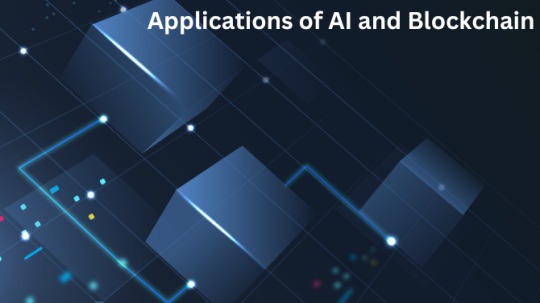
Blockchain and AI technology in India are proving to be a very powerful combination, enhancing almost every industry in which they are used. Blockchain technology and artificial intelligence are revolutionizing a wide range of industries, including media royalties, financial security, healthcare data sharing, and food supply chain logistics. By applying the same techniques used to safeguard food and healthcare operations, blockchain can also be utilized to produce trackable, traceable AI. Numerous factors are impacted by the combination of AI with blockchain, including security, as it will provide a dual defense against cyberattacks.
AI is capable of efficiently sifting through large datasets, generating fresh situations, and identifying trends based on data behavior. Blockchain makes it easier to get rid of errors and fake data sets. On a decentralized blockchain infrastructure, new classifiers and patterns produced by AI can be authenticated. Any business that interacts with customers, like retail transactions, can use this. AI can be utilized to provide marketing automation using client data obtained through blockchain technology.
How Blockchain Can Be Enhanced by AI
When blockchain and AI technology in India come together, the result may be the most dependable technologically enabled decision-making system in existence—virtually impervious to manipulation and capable of producing sound judgments and insights.
Improved company data models
globalized verification systems
creative audits and compliance systems
smarter finance, transparent governance
intelligent retail
intelligent predictive analysis
digital intellectual property rights
Coming together of blockchain and AI technology in India
Data
To solve the problem of explainable AI, blockchain's digital record provides information on the origins of the data it uses as well as the architecture underlying AI. This enhances confidence in the accuracy of the data and, consequently, in the advice that artificial intelligence offers.
Efficiency in operations
Data security, information accuracy, and operational efficiency can all be increased by combining blockchain and AI. Artificial intelligence (AI) can read, comprehend, and correlate data quickly and thoroughly. This capability elevates blockchain-based business networks to a new level of intelligence. Blockchain makes it possible to access vast amounts of data both inside and outside of a business, which enables AI to expand to produce more relevant insights, control data consumption and model sharing, and establish a reliable and open data market.
Automation
Blockchain, AI, and automation can provide new value to multi-party business processes by reducing friction, speeding up, and improving efficiency. For instance, AI models integrated into blockchain-based smart contracts can carry out transactions and suggest that users recall expired goods.
Decision making
Decentralized AI apps and algorithms are created with access to the same vision of a reliable and shared data platform for keeping your information, records, and judgments when blockchain technology and artificial intelligence are combined. When you maintain accurate records of every AI algorithm before, during, and after the process of learning and making decisions, this platform can be quite helpful.
Data collection
AI models have historically faced the challenge of gathering data, requiring connections to various datasets from various sources. Blockchain technology can assist in resolving this issue by offering a transparent and safe database for information storage, and artificial intelligence can simulate how the human mind solves problems. When combined, blockchain and data resources can enhance the reliability of the information that AI models employ.
Yatiken is an AI and blockchain development company, get in touch with us now to know more about our services.
Yatiken uses blockchain and ai technology in India, with a team of experts who possess in-depth knowledge and hands-on experience in these cutting-edge technologies.
As an AI development company in delhi, we leverage the latest tools and techniques to create innovative blockchain and AI solutions that drive efficiency and scalability.
Our track record of successfully delivering blockchain and AI projects speaks for itself, demonstrating that we are one of the best ai development agency in delhi-ncr.
As a blockchain technology companies in india/delhi, we understand that each project is unique, which is why we offer customized development services tailored to your specific requirements.
#technology#india#it services#digital marketing#Blockchain and AI technology in India#ai application development in india#blockchain technology companies in india/delhi#ai development company in delhi#best ai development agency in delhi-ncr
0 notes
Text
Empower Your Digital Presence with Cutting-Edge Frameworks
In today’s fast-evolving digital landscape, staying ahead requires more than just a functional website or application—it demands innovation and efficiency. At Atcuality, we specialize in Website and Application Framework Upgrade solutions tailored to your business goals. Whether you're looking to optimize performance, enhance user experience, or integrate the latest technologies, our team ensures seamless upgrades that align with industry standards. Transitioning to advanced frameworks not only improves loading speeds and scalability but also strengthens your cybersecurity measures. With Atcuality, you gain access to bespoke services that future-proof your digital assets. Let us elevate your online platforms to a new realm of excellence.
#ai applications#artificial intelligence#ai services#website development#website developer near me#website developers#website developer in india#web development#web design#application development#app development#app developers#digital marketing#seo services#seo#emailmarketing#search engine marketing#search engine optimization#digital consulting#virtual reality#vr games#vr development#augmented reality#augmented and virtual reality market#cash collection application#task management#blockchain#metaverse#cloud computing#information technology
8 notes
·
View notes
Text
Fleek IT Solutions is not just a name, it's a promise of exceptional software solutions that redefine business operations. As India's leading software company, Fleek has consistently delivered cutting-edge technology that drives growth and innovation.
Why Fleek is India's Best
Unmatched Expertise: With a team of highly skilled developers and industry veterans, Fleek boasts unparalleled expertise in crafting robust and scalable software solutions.Client-Centric Approach: Fleek understands that every business is unique. Their tailored solutions address specific needs, ensuring maximum ROI.Innovation at its Core: Fleek thrives on innovation, staying ahead of industry trends to provide cutting-edge solutions.Proven Track Record: A portfolio of successful projects across diverse industries speaks volumes about Fleek's reliability and efficiency.End-to-End Solutions: From concept to deployment, Fleek offers comprehensive software development services, streamlining the entire process.
Experience the Fleek Difference
Partner with Fleek IT Solutions to unlock your business's full potential. Their software solutions are more than just code; they are strategic assets that drive growth and success.
Contact Fleek today to embark on your digital transformation journey!
#FleekITSolutions#BestSoftwareCompany#India#SoftwareDevelopment#ITSolutions#Technology#Innovation#DigitalTransformation#WebDevelopment#MobileAppDevelopment#SoftwareTesting#CloudSolutions#AI#MachineLearning#BigData#Cybersecurity#DataAnalytics#Blockchain#IoT#DevOps#AgileMethodology#SoftwareConsulting#ITConsulting#BusinessGrowth#DigitalMarketing#Startup#Entrepreneur#TechStartup#MadeInIndia#IndianIT
0 notes
Text
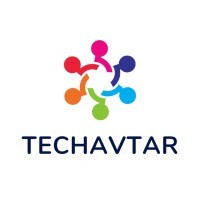
#Top Technology Services Company in India#Generative AI Development Company#AI Calling Software#AI Software Development Company#Best Chatbot Service Company#AI Calling Software Development#AI Automation Software#Best AI Chat Bot Development Company#AI Software Dev Company#Top Web Development Company in India#Top Software Services Company in India#Best Product Design Company in World#Best Cloud and Devops Company#Best Analytic Solutions Company#Best Blockchain Development Company in India#Best Tech Blogs in 2024#Creating an AI-Based Product#Custom Software Development for Healthcare#NexaCalling Best AI Calling Bot#Best ERP Management System#WhatsApp Bulk Sender#Neighborhue Frontend Vercel
0 notes
Text
Ethical Hacking: White Hats Making The Digital World Secure
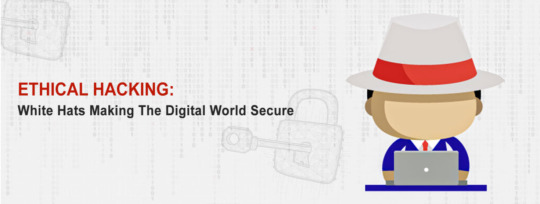
In today’s digital age, the term ‘Ethical Hacking’ is like a safety check. It is a crucial line of defence in our interconnected world. Simply put, ethical hacking is when hackers test computer systems to find and fix weak spots. This has a critical role because we hear about online fraud and phishing attacks all the time.
Ethical hacking is the good side of the hacking world. It’s about diving into systems, not to exploit, but to protect. It’s about wearing the white hat in a realm where not everyone plays by the rules.
Now, let’s break it down a bit. On one side, we have our heroes, the White Hats. These are the ethical hackers, the tech-savvy experts who use their skills to find and fix security gaps. They’re the digital guardians, ensuring our data stays safe and sound.
On the other side, there are the Black Hats. These are the experts with similar skills but different intentions. They’re out to find system loopholes, not to fix them, but to exploit them. It could be for money, fame, or just the thrill, their actions cause real damage.
But somewhere in between, we find the Grey Hats. These hackers might not always ask for permission but they do not necessarily have harmful intentions. They might spot a weakness, sneak in, but then give a heads-up to the organization about the gap they found.
Understanding these different hats is essential. It reminds us of the importance of ethical hacking and the role it plays in keeping our online world a safe place to work.
The Ethical Framework: A Moral Compass
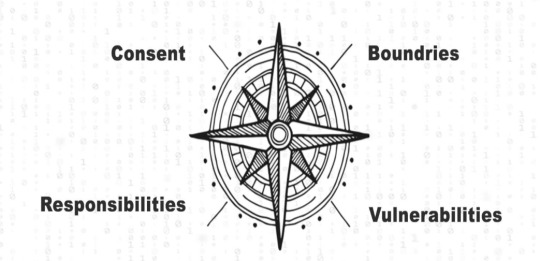
Ethical hacking, by its very name, carries a sense of responsibility. It’s not just about skills, but also about the ethics and principles that guide it. At its core, ethical hacking is about doing the right thing and ensuring that digital spaces are safe for everyone.
Consent is Everything. Ethical hackers don’t just dive into systems on impulse. They seek and have permission. They’re invited to test and explore, ensuring that systems are strong and secure. This separates them from malicious hackers who operate without any permission.
Boundaries are crucial too. Even with permission, there are limits. Ethical hackers respect them, ensuring they don’t overstep or cause unintended harm. They understand the importance of staying within the agreed-upon scope of their work and legalities can’t be ignored.
Ethical hacking might sound like a grey area, but it’s not. There are clear legal frameworks that define what’s acceptable and what’s not. Stepping outside these can lead to serious repercussions.
Ethical hackers work with integrity and report vulnerabilities. They respect client confidentiality and they do not misuse their access. They do not disclose vulnerabilities publicly without consent. And they certainly do not harm the system they’re testing.
The world of ethical hacking is guided by a strong moral compass. It’s a domain where skills meet responsibility, ensuring the digital world remains a safe space for all.
The Ethical Hack: A Step-by-Step Guide

An Ethical Hack is like a detective starting an investigation in a systematic and methodical manner. Let’s follow through this process.
Reconnaissance: This is the initial phase, often linked to a burglar stalking out a house before a heist. Ethical hackers gather as much information as possible about the target system. They look for domain names or IP addresses linked to a company in order to understand the target but from a distance.
Scanning: Now, the hacker gets a bit closer. Think of it as the detective using a magnifying glass to find fingerprints. In this phase, ethical hackers identify open ports or services running on servers. Tools like Nmap or Nessus might be used here. They help in detecting potential vulnerabilities in the system.
Gaining Access: This is the action phase. The hacker tries to exploit the vulnerabilities they’ve found. It’s like the detective finding an unlocked back door. They might use tools like Metasploit to find a way in. It is important to understand ethical hackers have permission and they are testing the locks and not stealing anything.
Maintaining Access: Here, the hacker acts like a spy, trying to create a backdoor for themselves. It’s about seeing if they can remain undetected in the system, highlighting potential risks. Can they stay without the system’s knowledge? If yes, then there’s a problem.
Post-Attack: Once the testing is done, ethical hackers must report their findings. It’s like a detective presenting evidence in court. They detail vulnerabilities found, data accessed, and how long they remained undetected. This information is crucial for strengthening the system further.
Tools and Techniques for Ethical Hacking
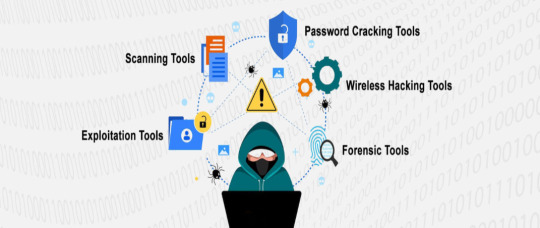
In the tech world, tools and techniques are essential. They are what make the process efficient and effective. Similarly, many are used in various stages of hacking.
Scanning Tools: As mentioned, tools like Nmap help hackers scan systems. It’s like a radar, detecting what’s out there. Nessus, on the other hand, is more about vulnerability assessment. Think of it as a health check-up for systems, spotting potential weak points.
Exploitation Tools: Metasploit is a big name here. It’s an application designed to find and exploit vulnerabilities. It’s like a locksmith’s set, helping hackers test every lock.
Password Cracking Tools: Sometimes, hackers need to crack passwords. Tools like John the Ripper or Hydra come into play. They test the strength of passwords, ensuring they are robust enough to keep intruders out.
Wireless Hacking Tools: In our wireless age, tools like Aircrack-ng are vital. They test the security of wireless networks. It’s about ensuring that Wi-Fi networks are as secure as their wired counterparts.
Forensic Tools: Post-attack, tools like Wireshark help in analyzing what happened. They dissect the hack, helping organizations understand and learn from it.
Ethical Hacking is a thorough process. It’s about understanding, testing, and strengthening digital defences. With the right tools and a systematic approach, ethical hackers ensure that the digital world remains a bit safer for all of us.
Why Ethical Hackers Are Essential

For some years, cyber threats have been escalating at an alarming rate. From data breaches to ransomware attacks, the online world faces constant threats. Despite this chaos, ethical hackers emerge as heroes. They’re the first line of defence, proactively identifying vulnerabilities before malicious hackers can exploit them. Their role is not just about finding weak spots but also recommending robust solutions to fortify these digital fortresses.
In 1995, Kevin Mitnick became “the world’s most famous hacker” after hacking codes from tech companies like Nokia, IBM, Microsoft and Motorola. He was once a notorious black hat hacker, who transformed into a white hat, using his skills to help organizations bolster their defenses.
Another instance is the “Heartbleed” vulnerability in OpenSSL. Ethical hackers were instrumental in identifying and mitigating this critical bug, preventing potential chaos.
The Learning Roadmap: Becoming an Ethical Hacker
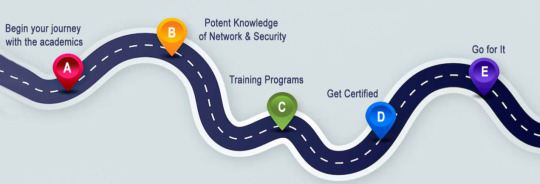
Thinking about becoming an ethical hacker is similar to setting out on an academic adventure. There is an oversupply of resources available for aspiring hackers. Platforms like Udemy, Coursera, and edX offer courses tailored for beginners and experts alike. For those seeking a structured learning path, certifications like CEH (Certified Ethical Hacker) or OSCP (Offensive Security Certified Professional) provide comprehensive curriculums.
Starting as a beginner, the world of hacking might seem overwhelming. But remember, every expert was once a beginner. The initial steps involve understanding basic cybersecurity concepts, networking, and operating systems and advanced steps include penetration testing, vulnerability assessment, and intrusion detection.
In the hacking community, certifications aren’t just pieces of paper; they’re badges of honour. The CEH certification equips learners with hands-on hacking techniques. GPEN (GIAC Penetration Tester) is another esteemed certification, focusing on penetration testing methodologies. For those seeking a challenge, OSCP is known for its rigorous 24-hour hacking exam. Lastly, CREST provides recognized accreditations in the penetration testing field. These certifications not only enhance knowledge but also open doors to lucrative career opportunities in cybersecurity.
In essence, becoming an ethical hacker is a journey of continuous learning. With the right resources, dedication, and certifications, one can master the art and science of ethical hacking, ensuring the digital world remains a safer place for all.
Is Ethical Hacking Legal?

Read the full article at: https://dsb.edu.in/ethical-hacking/?utm_source=tumblr&utm_medium=tumblr&utm_campaign=tumblr+ethical+hacking
#ai#india#education#chatgpt#google#gpt 4#banking#blockchain#fintech#jobs#ethical hacking#hacking#security#cyber security#technology#infosec#phishing
0 notes
Text
The Latest Trends and Technologies in India
Introduction:
India, with its rapidly growing economy and burgeoning tech industry, is witnessing a remarkable surge in innovative trends and cutting-edge technologies. From artificial intelligence and blockchain to renewable energy and digital transformation, India is embracing the future with open arms. In this article, we will explore the latest trends and technologies that are shaping various sectors in India and driving the nation towards a more prosperous and technologically advanced future.
Digital Transformation:
One of the most significant trends in India is the widespread adoption of digital transformation across industries. With the government's push towards a digital economy and initiatives like "Digital India," businesses and organizations are embracing technology to streamline operations and enhance customer experiences. E-commerce, online banking, and digital payments have become ubiquitous, enabling greater convenience and accessibility for the masses.
Artificial Intelligence (AI) and Machine Learning (ML):
India is making remarkable strides in the field of AI and ML. From chatbots and virtual assistants to predictive analytics and automation, AI is revolutionizing various sectors, including healthcare, finance, and manufacturing. Startups and tech giants alike are investing in AI research and development, making India a formidable player in the global AI landscape.
Internet of Things (IoT):
The Internet of Things is transforming the way people interact with everyday devices and objects. India's IoT market is expanding rapidly, enabling smart homes, connected vehicles, and smart city initiatives. mobile app development services in agriculture are also empowering farmers with real-time data and insights, enhancing productivity and sustainability.
Blockchain Technology:
Blockchain technology is gaining momentum in India, with numerous sectors exploring its potential. Fintech companies are leveraging blockchain for secure and transparent transactions, while supply chain management and healthcare are also benefiting from its immutable and decentralized nature. Government initiatives are exploring the use of blockchain for record-keeping and identity verification.
Renewable Energy:
India is committed to embracing renewable energy sources to combat climate change and reduce its dependence on fossil fuels. The country is a global leader in solar energy adoption, with ambitious targets for solar power capacity expansion. Wind energy and other renewable sources are also gaining traction, driving sustainable development in the energy sector.
5G Technology:
The rollout of 5G technology in India is highly anticipated. With its promise of ultra-fast internet speeds and low latency, 5G is expected to revolutionize communication, entertainment, and various industries. Telecom operators and tech companies are gearing up to deploy 5G networks, paving the way for a digitally connected future.
Electric Vehicles (EVs):
India is witnessing a surge in the adoption of electric vehicles as part of its efforts to reduce air pollution and promote sustainable transportation. The government's initiatives and incentives are encouraging the development and adoption of EVs across the country.
HealthTech and Telemedicine:
The COVID-19 pandemic accelerated the adoption of telemedicine and digital health solutions in India. HealthTech startups are providing remote healthcare services, teleconsultations, and health monitoring devices, making healthcare more accessible and efficient, especially in rural areas.
EdTech:
The EdTech sector is booming in India, especially after the pandemic-induced shift to online education. Online learning platforms and digital educational content are becoming increasingly popular, empowering students with personalized and accessible learning experiences.
Cybersecurity:
As digital adoption grows, so does the need for robust cybersecurity measures. India is investing in cybersecurity technologies and expertise to safeguard critical infrastructure, financial systems, and personal data.
Conclusion:
India's relentless pursuit of technological advancements is shaping its future as a digital powerhouse. The latest trends and technologies, such as digital transformation, AI, IoT, blockchain, and renewable energy, are driving innovation and progress across various sectors. With a strong focus on sustainability, inclusivity, and digital accessibility, India is poised to embrace the benefits of technology and make a significant impact on the global stage. As the nation continues to evolve and adapt to technological changes, it paves the way for a more prosperous and technologically advanced India.
#artificial intelligence#machine learning#cybersecurity#branding#health#electric vehicles in india#5g technology#blockchain#developer#ai#viral trends#viralpost#gamedev#coding#python#todaypost#india#technology#future trends#programming#healthtech#Digital Transformation#softwaredevelopment#automation#networking#mobile application development#software#flutter app development#web application development#web application security
1 note
·
View note
Text
Hire Dedicated Developers in India Smarter with AI
Hire dedicated developers in India smarter and faster with AI-powered solutions. As businesses worldwide turn to software development outsourcing, India remains a top destination for IT talent acquisition. However, finding the right developers can be challenging due to skill evaluation, remote team management, and hiring efficiency concerns. Fortunately, AI recruitment tools are revolutionizing the hiring process, making it seamless and effective.
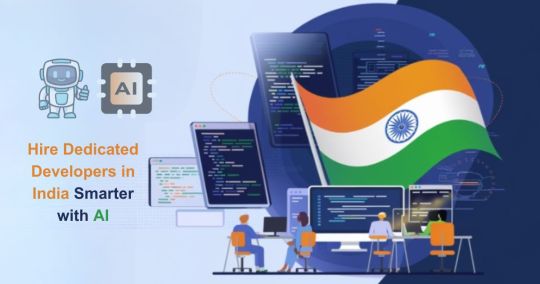
In this blog, I will explore how AI-powered developer hiring is transforming the recruitment landscape and how businesses can leverage these tools to build top-notch offshore development teams.
Why Hire Dedicated Developers in India?
1) Cost-Effective Without Compromising Quality:
Hiring dedicated developers in India can reduce costs by up to 60% compared to hiring in the U.S., Europe, or Australia. This makes it a cost-effective solution for businesses seeking high-quality IT staffing solutions in India.
2) Access to a Vast Talent Pool:
India has a massive talent pool with millions of software engineers proficient in AI, blockchain, cloud computing, and other emerging technologies. This ensures companies can find dedicated software developers in India for any project requirement.
3) Time-Zone Advantage for 24/7 Productivity:
Indian developers work across different time zones, allowing continuous development cycles. This enhances productivity and ensures faster project completion.
4) Expertise in Emerging Technologies:
Indian developers are highly skilled in cutting-edge fields like AI, IoT, and cloud computing, making them invaluable for innovative projects.
Challenges in Hiring Dedicated Developers in India
1) Finding the Right Talent Efficiently:
Sorting through thousands of applications manually is time-consuming. AI-powered recruitment tools streamline the process by filtering candidates based on skill match and experience.
2) Evaluating Technical and Soft Skills:
Traditional hiring struggles to assess real-world coding abilities and soft skills like teamwork and communication. AI-driven hiring processes include coding assessments and behavioral analysis for better decision-making.
3) Overcoming Language and Cultural Barriers:
AI in HR and recruitment helps evaluate language proficiency and cultural adaptability, ensuring smooth collaboration within offshore development teams.
4) Managing Remote Teams Effectively:
AI-driven remote work management tools help businesses track performance, manage tasks, and ensure accountability.
How AI is Transforming Developer Hiring
1. AI-Powered Candidate Screening:
AI recruitment tools use resume parsing, skill-matching algorithms, and machine learning to shortlist the best candidates quickly.
2. AI-Driven Coding Assessments:
Developer assessment tools conduct real-time coding challenges to evaluate technical expertise, code efficiency, and problem-solving skills.
3. AI Chatbots for Initial Interviews:
AI chatbots handle initial screenings, assessing technical knowledge, communication skills, and cultural fit before human intervention.
4. Predictive Analytics for Hiring Success:
AI analyzes past hiring data and candidate work history to predict long-term success, improving recruitment accuracy.
5. AI in Background Verification:
AI-powered background checks ensure candidate authenticity, education verification, and fraud detection, reducing hiring risks.
Steps to Hire Dedicated Developers in India Smarter with AI
1. Define Job Roles and Key Skill Requirements:
Outline essential technical skills, experience levels, and project expectations to streamline recruitment.
2. Use AI-Based Hiring Platforms:
Leverage best AI hiring platforms like LinkedIn Talent Insightsand HireVue to source top developers.
3. Implement AI-Driven Skill Assessments:
AI-powered recruitment processes use coding tests and behavioral evaluations to assess real-world problem-solving abilities.
4. Conduct AI-Powered Video Interviews:
AI-driven interview tools analyze body language, sentiment, and communication skills for improved hiring accuracy.
5. Optimize Team Collaboration with AI Tools:
Remote work management tools like Trello, Asana, and Jira enhance productivity and ensure smooth collaboration.
Top AI-Powered Hiring Tools for Businesses
LinkedIn Talent Insights — AI-driven talent analytics
HackerRank — AI-powered coding assessments
HireVue — AI-driven video interview analysis
Pymetrics — AI-based behavioral and cognitive assessments
X0PA AI — AI-driven talent acquisition platform
Best Practices for Managing AI-Hired Developers in India
1. Establish Clear Communication Channels:
Use collaboration tools like Slack, Microsoft Teams, and Zoom for seamless communication.
2. Leverage AI-Driven Productivity Tracking:
Monitor performance using AI-powered tracking tools like Time Doctor and Hubstaff to optimize workflows.
3. Encourage Continuous Learning and Upskilling:
Provide access to AI-driven learning platforms like Coursera and Udemy to keep developers updated on industry trends.
4. Foster Cultural Alignment and Team Bonding:
Organize virtual team-building activities to enhance collaboration and engagement.
Future of AI in Developer Hiring
1) AI-Driven Automation for Faster Hiring:
AI will continue automating tedious recruitment tasks, improving efficiency and candidate experience.
2) AI and Blockchain for Transparent Recruitment:
Integrating AI with blockchain will enhance candidate verification and data security for trustworthy hiring processes.
3) AI’s Role in Enhancing Remote Work Efficiency:
AI-powered analytics and automation will further improve productivity within offshore development teams.
Conclusion:
AI revolutionizes the hiring of dedicated developers in India by automating candidate screening, coding assessments, and interview analysis. Businesses can leverage AI-powered tools to efficiently find, evaluate, and manage top-tier offshore developers, ensuring cost-effective and high-quality software development outsourcing.
Ready to hire dedicated developers in India using AI? iQlance offers cutting-edge AI-powered hiring solutions to help you find the best talent quickly and efficiently. Get in touch today!
#AI#iqlance#hire#india#hirededicatreddevelopersinIndiawithAI#hirededicateddevelopersinindia#aipoweredhiringinindia#bestaihiringtoolsfordevelopers#offshoresoftwaredevelopmentindia#remotedeveloperhiringwithai#costeffectivedeveloperhiringindia#aidrivenrecruitmentforitcompanies#dedicatedsoftwaredevelopersindia#smarthiringwithaiinindia#aipowereddeveloperscreening
5 notes
·
View notes
Text
Hire a Mobile App Development Company in India Today
Looking for high-quality mobile app development at affordable prices? You’ve come to the right place. At Mobulous Technologies, we help startups, enterprises, and entrepreneurs turn their app ideas into stunning reality.
Why Choose India for Mobile App Development?
Access to the best Indian app developers for hire
Cost-effective pricing without compromising on quality
Skilled teams in Flutter app development, React Native, Android, and iOS
Seamless communication and project management
End-to-end solutions: UI/UX mobile app design to deployment
What We Offer
Custom Mobile App Development India
Cross-Platform App Development (Flutter, React Native)
On-Demand Mobile Apps
Android and iOS App Development Company India
Full-stack App Development Services India
Technologies We Work With
We combine the latest technologies to build modern, user-centric mobile application solutions:
Flutter App Development
React Native Developers
Swift, Kotlin, Node.js, Firebase
Figma, Adobe XD for UI/UX
AI, Blockchain, IoT, AR/VR integrations
Why Hire Us?
Recognized among the��top mobile app development companies India
500+ apps delivered across industries
ISO certified process, 100% NDA-secure
Dedicated project manager & on-time delivery
Trusted by global brands and startups alike
Affordable Mobile App Development in India
We offer flexible engagement models to suit all business sizes. Whether you’re building an MVP or a fully customized solution, our pricing fits your budget.
App Type with Estimated Cost (USD)
Basic App: $5,000 – $10,000
Mid-Level App: $10,000 – $30,000
High-End Custom App: $30,000+
How to Get Started
Step 1: Share your idea with us
Step 2: Get a detailed proposal with timeline and cost
Step 3: We build your app with frequent updates
Step 4: Launch your product and scale your business
Let’s Build Your App Together
Ready to build your dream app with the help of top-tier mobile app developers in India? Let Mobulous Technologies help you every step of the way.
Also Read This: https://sites.google.com/view/hiremobileappdevelope/10-reasons-you-should-hire-a-mobile-app-development-company-in-india-today
#mobile app development services in India#custom app development India#mobile app developers India#affordable app development India#Android app development#iOS app development#app development outsourcing#app development team India
2 notes
·
View notes
Text
Discover Indore’s Top 20 IT Companies Powering the Digital Future
Indore, the commercial capital of Madhya Pradesh, is rapidly emerging as one of India's fastest-growing IT hubs. With a strong educational backbone, improving infrastructure, and a business-friendly ecosystem, the city has become a magnet for innovative technology firms and startups. From cutting-edge software development to AI solutions and digital marketing, Indore's IT landscape is thriving.
Here’s a curated list of Top 20 IT Companies in Indore that are redefining technological excellence—and at the heart of it is InfiminTus Technologies, your partner for digital success.
1. InfiminTus Technologies
Your One-Stop Shop for Digital Success
At InfiminTus, we don’t just build websites or apps—we craft digital experiences. As one of Indore’s leading IT companies, we specialize in:
Web Design & Development
Mobile App Development
Brand Building
SEO & Digital Marketing
Custom Software Development
Cloud Computing & Cybersecurity
Our innovative approach, client-centric values, and a passion for technology make us a trusted partner for businesses seeking growth in the digital age.
2. Impetus Technologies
A global player headquartered in Indore, Impetus is known for its enterprise-level solutions in big data, analytics, and cloud platforms.
3. InfoBeans Technologies
A public listed company offering enterprise software development and design-led engineering to global clients.
4. Yash Technologies
With its roots in Indore, Yash is a multinational IT services provider specializing in SAP, cloud, and application services.
5. Systematix Infotech
A software development company providing AI, web, and mobile app solutions to clients worldwide.
6. CDN Solutions Group
Offering web, mobile, and software development solutions, CDN has delivered over 2200 projects globally.
7. Synsoft Global
This Indore-based firm excels in blockchain development, IoT solutions, and custom mobile/web apps.
8. Diaspark
Serving the retail and healthcare sectors, Diaspark provides software solutions, particularly in the jewelry industry.
9. Cyber Infrastructure (CIS)
A full-service IT company delivering software development, digital marketing, and IT consulting.
10. Webdunia
One of India’s pioneers in vernacular content and multilingual solutions, now excelling in IT services.
11–20: Other Rising IT Stars in Indore
WittyFeed (Now Vistaprint Digital)
Techvalens Software Systems
Walkover Web Solutions
Chapter247 Infotech
TCS Indore
Systango
RareDevs Innovations
Codezilla
NCS Pvt Ltd
Task Source
Why Indore?
With initiatives like the Super Corridor and the upcoming IT Park, Indore is building a solid digital infrastructure to support the growth of tech companies. The presence of top engineering colleges like IIT Indore and a growing startup culture further fuels innovation.
Final Thoughts
Whether you're a business looking for end-to-end digital solutions or a tech enthusiast seeking inspiration, the IT companies of Indore—including leaders like InfiminTus Technologies—are transforming ideas into impactful technology.
Ready to elevate your business? Partner with InfiminTus Technologies, and let's unlock digital success together.
2 notes
·
View notes
Text
The Future of E-commerce: Trends, Technology, and Transformation
E-commerce has revolutionized how the world shops, and the pace of this evolution shows no sign of slowing down. In the last two decades, we've gone from slow-loading online catalogs to AI-driven, hyper-personalized shopping experiences available at the tap of a smartphone. As we look toward the future, it becomes clear that e-commerce is not merely a convenient alternative to brick-and-mortar shopping—it’s shaping into an intelligent, immersive, and integrated ecosystem. From augmented reality (AR) to drone deliveries, the coming years will redefine the very fabric of consumerism. Here's a deep dive into the future of e-commerce and the trends that are shaping it.

The Future Of E-commerce In India
1. AI and Personalization: Smarter Shopping Experiences
Artificial Intelligence (AI) is already embedded in e-commerce through chatbots, recommendation engines, and predictive analytics. But in the future, AI will evolve from a helpful tool to a cornerstone of every online retail experience. Imagine an e-commerce platform that not only knows what you like but also predicts what you’ll need before you even realize it.
AI will enable hyper-personalization, tailoring product suggestions, discounts, and marketing messages based on user behavior, browsing patterns, past purchases, and even emotional cues detected from facial recognition or voice tone (in the case of smart devices). This will result in increased customer satisfaction and retention, as shoppers will feel uniquely catered to.
2. Augmented Reality and Virtual Reality: Try Before You Buy
Augmented Reality (AR) and Virtual Reality (VR) are poised to bridge the gap between physical and digital shopping. AR allows customers to visualize products in their real-world environment—like placing a virtual couch in your living room using your smartphone camera. VR, on the other hand, can offer fully immersive shopping environments that mimic the in-store experience.
Retailers like IKEA, Sephora, and Warby Parker are already using AR to enhance customer confidence and reduce returns. As the technology becomes more mainstream and affordable, smaller businesses will also adopt it, making virtual try-ons and immersive product demos a norm in online shopping.
3. Voice Commerce and Conversational Shopping
With the proliferation of smart speakers like Amazon Echo and Google Nest, voice commerce is gaining traction. Voice-enabled shopping allows users to search for products, place orders, and track shipments simply by speaking to their devices.
In the near future, voice assistants will become more conversational, capable of understanding complex queries and offering context-aware suggestions. This hands-free, frictionless mode of shopping will particularly appeal to multitaskers and busy households, making it an integral part of the e-commerce landscape.
4. Sustainability and Ethical Commerce
Modern consumers, especially Gen Z and millennials, are increasingly concerned about the ethical and environmental impact of their purchases. E-commerce companies are responding by investing in sustainable practices—like biodegradable packaging, carbon-neutral shipping, and transparent sourcing.
Future e-commerce platforms will likely include filters for “eco-friendly,” “ethically sourced,” or “locally made” products. Brands that can prove their commitment to sustainability through verified practices will enjoy greater loyalty and market share.
Blockchain technology may also play a role in ethical commerce, providing transparent, tamper-proof records of a product’s supply chain and ensuring authenticity for things like organic certifications or fair trade sourcing.
5. Omnichannel Integration: Seamless Shopping Across Platforms
The future of e-commerce isn't limited to websites. It’s increasingly blending across platforms—social media, mobile apps, physical stores, and even smart TVs. This omnichannel approach ensures a unified customer experience, regardless of where or how a person shops.
For instance, a customer may discover a product on Instagram, research it on their laptop, try it in AR on a mobile app, and finally purchase it via voice assistant—all without losing their shopping cart, preferences, or data. The brands that can offer this seamless continuity will lead the way in customer satisfaction.
6. Faster, Smarter Fulfillment and Delivery
Consumer expectations for delivery speed are higher than ever. Thanks to Amazon Prime, two-day or even same-day shipping has become a baseline for convenience. In the future, we’ll see even faster fulfillment through automation, robotics, and drone deliveries.
Warehouses will be run by AI-powered robots capable of picking, packing, and shipping with incredible efficiency. Last-mile delivery, often the most expensive and time-consuming part of logistics, may be handled by autonomous vehicles or drones, especially in urban environments.
Additionally, micro-fulfillment centers located within cities will help brands store popular products closer to their customers, speeding up delivery and reducing environmental impact.
7. Cryptocurrency and New Payment Methods
The future of e-commerce will likely include a broader array of payment methods. Digital wallets like Apple Pay and Google Pay are already mainstream, but cryptocurrency is slowly entering the retail space as well.
As blockchain technology becomes more scalable and secure, crypto payments may offer a decentralized, low-fee, and global payment alternative. Some companies are already accepting Bitcoin and Ethereum for online purchases, and this trend is expected to grow—particularly in cross-border commerce, where traditional currency exchange can be slow and costly.
Buy Now, Pay Later (BNPL) options will also continue to evolve, with more flexible financing models being integrated directly into the checkout process.
8. Social Commerce: Shopping Through Social Media
Social media is no longer just a place to discover products—it’s becoming the platform where purchases happen. Platforms like Instagram, TikTok, Facebook, and Pinterest are now equipped with direct shopping features that let users buy products without ever leaving the app.
In the future, influencer-led commerce and live-stream shopping will grow. Influencers can host live product demos with real-time purchasing options, combining entertainment and shopping in a way that resonates with younger audiences.
9. Artificial Storefronts and Digital Twins
As AI continues to evolve, we may see the rise of AI-generated storefronts, tailored specifically for individual users. Instead of browsing a generic website, users may interact with a dynamically generated storefront based on their tastes, browsing history, and current interests.
Similarly, digital twins—virtual replicas of stores or products—could allow users to explore entire retail environments digitally, perhaps even through VR headsets. This would offer a near-tangible experience from the comfort of home.
10. Globalization and Localization
E-commerce allows businesses to reach global markets, but success often depends on localizing the experience. This includes language, currency, cultural relevance, and even logistics infrastructure.
In the future, smart platforms will be able to localize on-the-fly, adapting everything from product recommendations to advertising tone based on the user's region. At the same time, businesses will benefit from global infrastructure tools that make international shipping, customs compliance, and foreign exchange seamless.
2 notes
·
View notes
Text
Future of ERP Software in India – Trends to Watch in 2025
As we approach the midpoint of this transformative decade, businesses across India are more reliant than ever on advanced technological solutions to stay competitive and agile. Among these, Enterprise Resource Planning (ERP) software continues to evolve rapidly, becoming an indispensable tool for enterprises aiming to streamline operations, enhance efficiency, and drive strategic growth. At Nivida Software, recognised among the Best ERP software providers in Vadodara and widely trusted as one of the Best ERP software providers in Gujarat, we consistently strive to keep ahead of industry shifts and emerging technologies. Today, we're exploring the pivotal trends set to shape the future of ERP software in India in 2025.

1. AI-Powered Predictive Analytics:
Artificial intelligence is no longer merely a concept from the distant future; rather, it is increasingly becoming the foundation of enterprise resource planning software. As of the year 2025, predictive analytics that is powered by artificial intelligence will have become the norm, making it possible for Indian enterprises to foresee market swings, consumer behaviour, and internal operational disturbances in advance. With the use of powerful predictive analytics, enterprise resource planning (ERP) systems will enable businesses to make decisions in real-time that are well-informed, thereby minimising risks and increasing profits.
2. Increased Cloud Adoption:
Cloud technology, already integral to ERP solutions, will witness unprecedented adoption rates. The ease of deployment, scalability, and cost-effectiveness of cloud-based ERP software makes it highly attractive, especially for SMEs in India. As one of the Best ERP software providers in India, Nivida Software anticipates that by 2025, the majority of Indian enterprises, regardless of size, will leverage cloud ERP solutions to stay agile, innovative, and resilient.
3. Customisation and Personalisation:
One-size-fits-all solutions are quickly becoming outmoded, and customisation and personalisation are becoming increasingly important. By the year 2025, enterprise resource planning (ERP) systems will primarily lean towards customised customisation, which will provide features and functionalities that are suited to the specific requirements of each company. The implementation of this change will result in increased flexibility, which will enable businesses in Vadodara, Gujarat, and throughout India to make the most of their ERP investments in terms of both efficacy and applicability.
4. Enhanced Mobile Accessibility:
Given that India is expected to have more than 900 million mobile users by the year 2025, enterprise resource planning software needs to become mobile-friendly in a smooth manner. Increasingly, enterprise resource planning (ERP) suppliers will emphasize mobile-first designs, which will enable employees to access essential data and capabilities from any location and at any time. Because of this accessibility, productivity and response time will be significantly improved, both of which are crucial characteristics in the fast-paced business scene of today.
5. Integration with IoT:
The Internet of Things (IoT) will have a significant influence on the future of enterprise resource planning (ERP) systems in India. With the help of Internet of Things integration, organisations can collect data in real-time from a wide variety of devices and gear, and then feed that data directly into ERP platforms for immediate analysis and action. This trend is going to transform industries such as agriculture, manufacturing, and logistics by making operations more transparent, efficient, and responsive. For example, manufacturing will be revolutionised.
6. Blockchain-Enabled ERP Systems:
Security, transparency, and traceability are increasingly vital in an interconnected business environment. Blockchain integration in ERP software will play a significant role in addressing these needs. By 2025, we expect blockchain to become a central component within ERP solutions, offering enhanced data security, fraud prevention, and improved transparency across supply chains, particularly in sectors such as pharmaceuticals, finance, and agriculture.
7. Sustainability and Environmental Compliance:
Environmental sustainability and regulatory compliance are becoming non-negotiable priorities globally, and India is no exception. Future ERP systems will actively support businesses in tracking, managing, and reporting their environmental footprints and compliance requirements. ERP solutions will thus become crucial tools for enterprises to stay compliant, reduce environmental impact, and maintain market reputation.
8. Advanced User Experience (UX):
Gone are the days when ERP systems were complicated and cumbersome. In the coming years, user experience will be front and centre. ERP solutions will incorporate intuitive interfaces, simplified navigation, and engaging visual dashboards, making complex data accessible and actionable even for non-technical employees. At Nivida Software, we are already pioneering such advancements, reinforcing our position as one of the Best ERP software providers in Gujarat.
9. Real-time Data Processing and Reporting:
By 2025, ERP software will fully transition into real-time data processing systems. Businesses will no longer rely on batch processing or delayed reports. Real-time analytics and instantaneous reporting capabilities will become standard, allowing enterprises to react swiftly to changing market dynamics, operational issues, and emerging opportunities.
10. Increasing Focus on Data Privacy and Security:
With data becoming an invaluable asset, concerns regarding its privacy and security continue to rise. Future ERP systems will incorporate advanced cybersecurity measures and rigorous data protection protocols. Providers who prioritise security and privacy will lead the industry, building trust among their clientele.
Closing Thoughts:
The future of ERP software in India is bright, with advancements promising unprecedented opportunities for growth, innovation, and efficiency. By embracing AI, cloud technology, customisation, mobile accessibility, IoT, blockchain, sustainability measures, enhanced UX, real-time processing, and stringent data security, businesses across Vadodara, Gujarat, and India will unlock new potential for success.
At Nivida Software, recognised consistently as one of the Best ERP software providers in India, we’re committed to helping enterprises navigate these exciting transformations. By continually evolving our offerings, staying ahead of trends, and addressing emerging business challenges, we strive to empower our clients with cutting-edge ERP solutions. The future is here, and it’s smart, secure, and sustainable. Welcome to the ERP landscape of 2025.
3 notes
·
View notes
Text
The Road Ahead – Navigating the Future of the Automotive Industry
🌍 Market Overview
The Global automotive industry Market Size is evolving rapidly, driven by technological advancements, sustainability initiatives, and changing consumer preferences. Automakers are embracing electric vehicles (EVs), autonomous technology, and digital transformation to stay ahead.
Download a Free Sample : https://rb.gy/iwh4in
📈 Growth Drivers
✅ Electrification – Rise in EV adoption due to sustainability goals and government incentives. ✅ Autonomous Vehicles – Investments in self-driving technology from major players like Tesla, Waymo, and GM. ✅ Connectivity & IoT – Smart features, in-car AI, and enhanced safety tech. ✅ Urbanization & Mobility Services – Growth of ride-sharing and subscription-based vehicle models.
⚠️ Key Challenges & Factors
🚧 Chip Shortages – Semiconductor supply chain disruptions affecting production. 🚧 Regulatory Hurdles – Stricter emissions policies worldwide. 🚧 Consumer Preferences – Shift towards SUVs and electric mobility. 🚧 Raw Material Costs – Fluctuations in lithium, nickel, and other EV battery components.
🔥 Emerging Trends
🔹 EV Market Boom – Tesla, Rivian, and legacy automakers expanding electric fleets. 🔹 Hydrogen Fuel Cell Tech – Toyota & Hyundai leading innovations. 🔹 Sustainable Manufacturing – Recycling initiatives & carbon-neutral plants. 🔹 Software-Defined Vehicles – Over-the-air (OTA) updates & AI-driven enhancements.
Related Urls :
https://www.sphericalinsights.com/reports/automotive-blockchain-market https://www.sphericalinsights.com/reports/china-halal-logistics-market
#AutomotiveIndustry 🚗 |#EVRevolution ⚡ |#CarTrends 🚘 |#FutureOfMobility 🌍 |#AutoTech 🔧 |#ElectricVehicles 🔋 |#AutonomousCars 🤖 |#GreenMobility 🌱 |#CarManufacturing 🏭 |#SmartCars 📡 |#SustainableTransport 🚀 |#AutoInnovation 🔥 |#NextGenVehicles 🚙 |#AutomotiveMarket 📈 |#MobilitySolutions 🚦
2 notes
·
View notes
Text
Best 10 Blockchain Development Companies in India 2025
Blockchain technology is transforming industries by enhancing security, transparency, and efficiency. With India's growing IT ecosystem, several companies specialize in blockchain development services, catering to industries like finance, healthcare, supply chain, and gaming. If you're looking for a trusted blockchain development company in India, here are the top 10 companies in 2025 that are leading the way with cutting-edge blockchain solutions.
1. Comfygen
Comfygen is a leading blockchain development company in India, offering comprehensive blockchain solutions for businesses worldwide. Their expertise includes smart contract development, dApps, DeFi platforms, NFT marketplaces, and enterprise blockchain solutions. With a strong focus on security and scalability, Comfygen delivers top-tier blockchain applications tailored to business needs.
Key Services:
Smart contract development
Blockchain consulting & integration
NFT marketplace development
DeFi solutions & decentralized exchanges (DEX)
2. Infosys
Infosys, a globally recognized IT giant, offers advanced blockchain solutions to enterprises looking to integrate distributed ledger technology (DLT) into their operations. Their blockchain services focus on supply chain, finance, and identity management.
Key Services:
Enterprise blockchain solutions
Smart contracts & decentralized apps
Blockchain security & auditing
3. Wipro
Wipro is known for its extensive research and development in blockchain technology. They help businesses integrate blockchain into their financial systems, healthcare, and logistics for better transparency and efficiency.
Key Services:
Blockchain consulting & strategy
Supply chain blockchain solutions
Smart contract development
4. Tata Consultancy Services (TCS)
TCS is a pioneer in the Indian IT industry and provides robust blockchain solutions, helping enterprises optimize business processes with secure and scalable decentralized applications.
Key Services:
Enterprise blockchain development
Tokenization & digital asset solutions
Decentralized finance (DeFi) applications
5. Hyperlink InfoSystem
Hyperlink InfoSystem is a well-established blockchain development company in India, specializing in building customized blockchain solutions for industries like finance, gaming, and supply chain.
Key Services:
Blockchain-based mobile app development
Smart contract auditing & security
NFT marketplace & DeFi solutions
6. Tech Mahindra
Tech Mahindra provides blockchain-as-a-service (BaaS) solutions, ensuring that businesses leverage blockchain for improved transparency and automation. They focus on finance, telecom, and supply chain industries.
Key Services:
Blockchain implementation & consulting
dApp development & smart contracts
Digital identity management solutions
7. Antier Solutions
Antier Solutions is a specialized blockchain development firm offering DeFi solutions, cryptocurrency exchange development, and metaverse applications. They provide custom blockchain solutions for startups and enterprises.
Key Services:
DeFi platform development
NFT & metaverse development
White-label crypto exchange development
8. HCL Technologies
HCL Technologies offers enterprise blockchain development services, focusing on improving security, efficiency, and automation across multiple sectors.
Key Services:
Blockchain-based digital payments
Hyperledger & Ethereum development
Secure blockchain network architecture
9. SoluLab
SoluLab is a trusted blockchain development company working on Ethereum, Binance Smart Chain, and Solana-based solutions for businesses across industries.
Key Services:
Smart contract & token development
Decentralized application (dApp) development
AI & blockchain integration
10. Mphasis
Mphasis provides custom blockchain solutions to enterprises, ensuring secure transactions and seamless business operations.
Key Services:
Blockchain for banking & financial services
Smart contract development & deployment
Blockchain security & risk management
Conclusion
India is emerging as a global hub for blockchain technology, with companies specializing in secure, scalable, and efficient blockchain development services. Whether you're a startup or an enterprise looking for custom blockchain solutions, these top 10 blockchain development companies in India provide world-class expertise and innovation.
Looking for the best blockchain development partner? Comfygen offers cutting-edge blockchain solutions to help your business thrive in the decentralized era. Contact us today to start your blockchain journey!
2 notes
·
View notes
Text

As a top technology service provider, Tech Avtar specializes in AI Product Development, ensuring excellence and affordability. Our agile methodologies guarantee quick turnaround times without compromising quality. Visit our website for more details or contact us at +91-92341-29799.
#Top Technology Services Company in India#Generative AI Development Company#AI Calling Software#AI Software Development Company#Best Chatbot Service Company#AI Calling Software Development#AI Automation Software#Best AI Chat Bot Development Company#AI Software Dev Company#Top Web Development Company in India#Top Software Services Company in India#Best Product Design Company in World#Best Cloud and Devops Company#Best Analytic Solutions Company#Best Blockchain Development Company in India#Best Tech Blogs in 2024#Creating an AI-Based Product#Custom Software Development for Healthcare#Best ERP Management System#WhatsApp Bulk Sender#Neighborhue Frontend Vercel
0 notes
Text
The Social Dilemma: Dark Side of Social Media

We’re living in a world where scrolling through social media feeds has become as habitual as breathing. The eye-opening Netflix documentary “The Social Dilemma” emerges as a cautionary tale that uncovers the hidden realities behind our favourite online platforms. It delves into the depths of the social media abyss, exploring the dark side of social media and the invisible strings that pull at the minds and hearts of users worldwide. As we become entangled in the web of likes, comments, shares, subscriptions and retweets, it is imperative to reflect on the potentially harmful consequences they can have on individuals and society as a whole.

Addiction is a significant concern when it comes to social media use. These platforms are designed to be addictive, creating a dopamine-driven feedback loop that keeps users hooked.
“There are only two industries that call their customers ‘users’: illegal drugs and software.” – Edward TufteZ Renowned American Statistician and Professor
According to studies, excessive use of social media can lead to increased rates of depression, anxiety, and loneliness. The constant comparison to others and the pressure to maintain a perfect online image can lead to low self-esteem and negative self-perception.
These Social Media sites have their own algorithms that show users content they are more likely to agree with and interact with, which can lead to the reinforcement of existing beliefs and the amplification of extreme opinions. Polarization and the decline of respectful conversations can be attributed to social media algorithms that create echo chambers.
The spread of misinformation and fake news on social media has become a significant problem, contributing to the public’s mistrust of traditional media and institutions. The platform’s algorithms prioritize engagement, inadvertently promoting sensationalist and misleading content.
The personal data of users is collected and monetized by social media platforms, as they gather information about their interests, preferences, and online behaviour. This data is then sold to advertisers, who use it to create targeted ads that cater to the specific desires and needs of each user. This practice raises concerns about privacy, as individuals may not be fully aware of the extent to which their data is being used and shared. Furthermore, the use of personal data for targeted advertising opens the door for potential manipulation, as advertisers and platforms can influence users’ purchasing decisions and even their opinions on various topics.
“If you’re not paying for the product, you are the product.” –Shoshana Zuboff Author of “The Age of Surveillance Capitalism”

The Documentary talks about “The attention economy”, which monetizes users’ time and attention, leading to the development of addictive platforms that prioritize engagement over well-being.
It also delves into the algorithms that influence users’ behaviour and beliefs. These algorithms are designed to predict and manipulate users’ interests, creating a personalized online experience. This customization comes at the cost of ethical concerns, as it can exploit vulnerabilities and manipulate emotions.

Our journey into the digital abyss takes an intriguing turn when we consider the rise of artificial intelligence (AI). Notable figures in the tech world and beyond have expressed their apprehensions about the pervasive spread and potential misuse of AI technologies.
Geoffrey Hinton, the acclaimed pioneer of AI, has expressed his fears concerning AI’s unchecked growth. He cautions that as AI systems become more powerful and autonomous, they could potentially be used maliciously, leading to devastating effects. Hinton suggests that AI, if unregulated, could enable oppressive surveillance, enhance the spread of misinformation, or even facilitate autonomous weapons. The ‘Godfather of AI’ urges for safeguards and ethical guidelines to prevent such possible misuse and to ensure that the technology is employed to benefit humanity.
US President Joe Biden, acknowledging these concerns, summoned top tech executives including Google’s Sundar Pichai and Microsoft’s Satya Nadella to discuss AI’s safety mechanisms and to tackle the rising threats posed by this rapidly advancing technology. The goal was clear: to ensure the tech giants are taking necessary precautions against the potential dangers of AI and to establish more robust regulations to protect the public from AI-induced risks.
The world of finance is not oblivious to the rising power of AI. Legendary investor Warren Buffet has compared AI to an “atom bomb” due to its potential destructive capabilities. Buffet’s apprehensions stem from AI’s power to outperform humans in various tasks, its autonomy, and the potential for it to be exploited for harmful purposes. Despite these concerns, Buffet acknowledges the transformative potential of AI, especially in industries like healthcare and automotive.
AI, like social media, represents a powerful tool that holds both immense promise and potential threats. As users of technology and as a society, it’s crucial to stay informed, critical, and demanding of ethical considerations in these fields. As we navigate through this new age of AI, let’s tread with caution, but also embrace the potential benefits and transformations AI can bring about.

Following the release of “The Social Dilemma,” the public response was significant, leading to a broader conversation about the role of social media in society. Social media giants, including Facebook, have been forced to address concerns raised in the documentary.
In response to the film, Facebook published an article titled “What The Social Dilemma Gets Wrong,” which attempted to counter some of the documentary’s claims and highlight the steps the company has taken to address user concerns.
Facebook argued that the documentary misrepresented certain aspects of its platform, such as the company’s commitment to combating misinformation and protecting user privacy. Facebook also highlighted the steps they have taken to address user concerns, such as implementing changes to their algorithms and developing new tools to promote user well-being.

This eye-opening documentary has started important discussions about the ethical issues and social impact of our online activities. By revealing the hidden forces that control these platforms, the film….
To read the full article: https://dsb.edu.in/the-social-dilemma-dark-side-of-social-media/?utm_source=Tumblr&utm_medium=Tumblr&utm_campaign=social+dilemma
#social media#dilemma#netflix#facebook#social dilemma#ai#india#jobs#blockchain#google#education#banking#gpt 4#fintech#chatgpt#politics#saas technology#tech#technology
1 note
·
View note
Text
Top Global Solution IT Service Providers in New Delhi

New Delhi, the bustling capital of India, has emerged as a major hub for the IT industry. With a growing demand for digital transformation, businesses are increasingly relying on IT service providers to streamline their operations, enhance security, and develop innovative solutions. Here’s a look at some of the Top global IT service providers in New Delhi that are leading the way in technology solutions and support.
Tata Consultancy Services (TCS)
TCS is one of the largest IT service providers in India and has a strong presence in New Delhi. The company specializes in IT consulting, cloud solutions, artificial intelligence, and cybersecurity. With decades of experience and a global presence, TCS provides cutting-edge solutions for enterprises across industries.
HCL Technologies
Headquartered in Noida, close to New Delhi, HCL Technologies is a global IT services company known for its expertise in software development, IT infrastructure management, and digital transformation solutions. The company has a strong clientele across banking, healthcare, and manufacturing sectors.
Wipro Limited
Wipro is another IT giant with a significant footprint in New Delhi. It offers services in cloud computing, data analytics, business process outsourcing (BPO), and cybersecurity. Wipro's commitment to innovation and sustainability has made it a preferred IT partner for enterprises worldwide.
Infosys
Infosys is a leader in IT services and consulting, providing businesses with digital transformation solutions, AI-driven insights, and enterprise cloud services. The company has a strong presence in the capital and supports industries such as finance, retail, and healthcare.
Tech Mahindra
Tech Mahindra, part of the Mahindra Group, is a well-established IT service provider in New Delhi. The company focuses on telecom, IT consulting, and digital transformation services. It also offers specialized solutions in AI, blockchain, and IoT for businesses looking to innovate.
NIIT Technologies (Coforge)
Now known as Coforge, NIIT Technologies is a renowned IT service provider in New Delhi, specializing in digital services, cloud computing, and application development. The company serves industries like travel, banking, and insurance with customized IT solutions.
Cognizant
Cognizant has a strong presence in New Delhi, providing IT solutions in digital engineering, AI, and data analytics. The company caters to industries such as healthcare, retail, and finance, helping businesses achieve digital growth.
IBM India
IBM India is a trusted name in IT services, offering cloud solutions, AI, cybersecurity, and blockchain technology. With an established base in New Delhi, IBM supports enterprises in enhancing their IT infrastructure and business processes.
Dell Technologies
Dell provides IT consulting, hardware solutions, cloud computing, and enterprise-grade cybersecurity services. Businesses in New Delhi rely on Dell for data storage, virtualization, and IT infrastructure solutions.
OrangeMantra
A fast-growing IT solutions provider based in Gurugram, near New Delhi, OrangeMantra offers web development, mobile app development, AI-based solutions, and e-commerce platforms. The company caters to startups and established enterprises looking for customized IT services.
2 notes
·
View notes